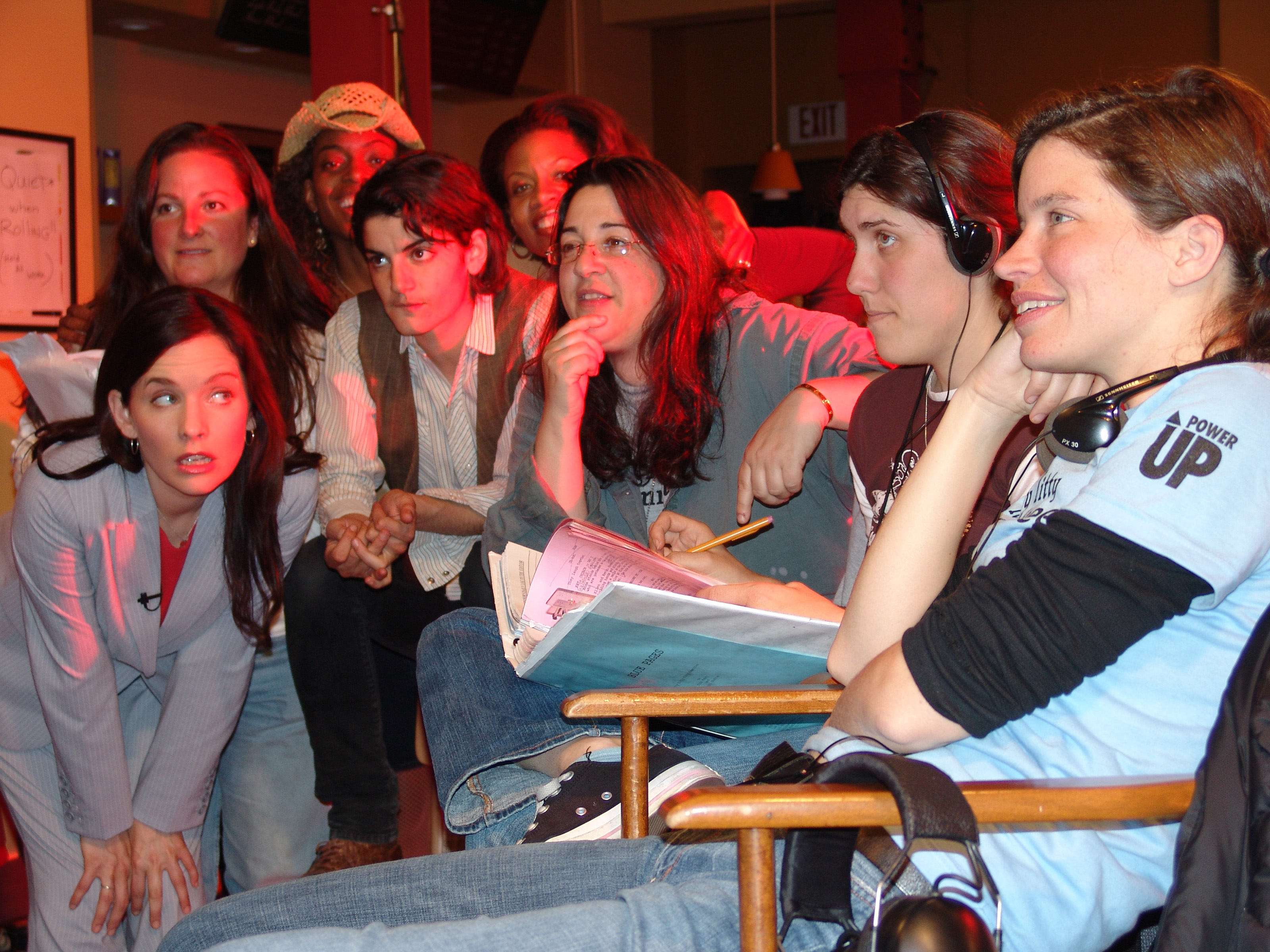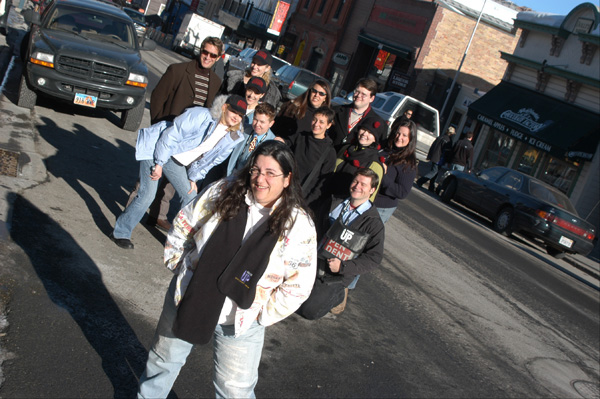
Stacy Codikow, Founder and Director of POWER UP
Ten years ago, Stacy Codikow founded the POWER UP organization with the goal of promoting “the visibility and integration of gay women in entertainment, arts and all forms of media.” Since October 2000, POWER UP has challenged perception through film, producing a dozen award-winning short films, many of which premiered at the Sundance Film Festival, as well as Anti-Prop 8 Public Service Announcements (PSAs), Marriage Equality PSAs, an Anti-Domestic Violence music video, and two feature films: Angela Robinson’s GIRLTRASH: All Night Long and Jamie Babbit’s Itty Bitty Titty Committee.
“The Entertainment Industry has always been extremely supportive of POWER UP and our award winning films,” Codikow was quoted as saying, “with Showtime being our longest and biggest financial sponsor.” POWER UP gained respect in the industry through its educational programs, which include the “Short Film Production Grant Program” and the “Feature Film ‘On-Set Film School’ Mentee Program.” Well over 50 women currently working on network television shows and studio feature films are success stories for POWER UP.
I was fortunate enough to steal some of Stacy’s time for a question-and-answer session in which she discussed the importance of POWER UP and the organization’s mission in today’s society as well as some of the projects that the organization has been involved with over the past ten years.
Paige MacGregor: Can you tell our readers a bit about how and why you decided to start POWER UP?
Stacy Codikow: POWER UP — the Professional Organization of Women in Entertainment Reaching Up — was started as a way to meet other gay women in the entertainment business, to network and to promote filmmakers artistic endeavors. POWER UP was announced in Variety on Oct. 11, 2000 (National Coming Out Day). I had put together a board of directors of some truly respected out women in Hollywood and with that announcement POWER UP was born.
PM: What is the mission of the organization and how do you see POWER UP fulfilling that mission on a daily, weekly, monthly, or even yearly basis?
SC: “To promote the visibility and integration of gay women in entertainment, the arts, and all forms of media.” We have produced 12 short films, four of them premiering at the Sundance Film Festival; we have produced 25 PSA spots; we have produced two feature films — Itty Bitty Titty Committee premiered at Berlin International Film Festival and won Best Feature at SXSW in 2007. Currently we are in post on GIRLTRASH: All Night Long. We are the only non-profit, volunteer-run, film production company and educational organization. POWER UP develops, finances, produces and distributes GLBTQ films and conducts educational programs, consisting of filmmaking classes, workshops, seminars, mentorships and more. Everything POWER UP does continues to move our mission forward. We are challenging perception through film.

Stacy Codikow on set of a POWER UP film
PM: When you started POWER UP, did you ever think that you’d be celebrating its ten year anniversary in 2010 or that it would be as successful as it has been thus far?
SC: When I started, I was so focused on starting something that never existed, a production company that would finance and produce (gay or made by gays) films, even though there was no distribution outlets at the time (the gay networks came after us). I wanted these women to have an opportunity to create change and I knew these films would play at festivals and with my proven track record of making films inexpensively and putting recognizable talent in them, they would go far. So, I suppose I realized they would have an impact on society and that’s why I wanted to do it.
PM: Can you describe for our readers what it means to you that POWER UP is celebrating its tenth anniversary this year?
SC: It means that there is a need for POWER UP and that gay filmmakers recognize that there is a company who wants to tell their stories and support their visions. Also, that the POWER UP films and filmmakers are respected and have gone on to create more positive change and opportunities in the world for others.
PM: How have you gone about promoting POWER UP and recruiting new talent for the organization?
SC: This is the best part; the films do that for us. Angela Robinson’s POWER UP short, D.E.B.S., premiered at Sundance and was purchased by Sony to be made into a feature film. That is unheard of. The press was an amazing boost to our fledgling organization early on. Our first feature Itty Bitty Titty Committee, premiered at Berlin, [and] was nominated for the Teddy Award. Then it had its domestic premiere at SXSW and won Best Feature. It is that type of success that becomes POWER UP’s calling card. We have won so many awards with our films and have the esteem of the highest grossing gay indie Opening Weekend (per theatre) numbers ever. So we have done something right, in who we have chosen to work with and the caliber of these projects, that have gone on to promoting the company with their successes.
PM: Can you tell our readers about some of the challenges that POWER UP and its members have faced during the organization’s ten-year history? Did you anticipate any of these problems or issues when you began POWER UP?
SC: Money is, [has] always been, and probably will always be the biggest challenge that POWER UP faces. While we are able to make films for far less than most, due to tons of in-kind gifts that our 501 (c)(3) status affords us, we still do need to raise money. I thought people would be more generous. I had hoped that more people and companies would want to give donations to support the work of these gifted filmmakers. But raising money is still our biggest challenge. I am still looking for the “hook” to encourage everyone to make a donation to help create change and support the educational programs that accompany our filmmakers. We have an amazing mentorship program that allowed 25 women and men to participate in the making of our latest film, GIRLTRASH: All Night Long. But these program cost money and we need to reach out more to ask for support.
PM: What is your favorite aspect of being involved with POWER UP? Why?
SC: EASY, my favorite part is creating films that will forever be out there. I am so proud to be involved in the careers of talented storytellers like Jamie Babbit (But I’m a Cheerleader, The Quiet), Angela Robinson (Herbie: Fully Loaded, D.E.B.S.), Cherien Dabis (Amreeka — nominated for Best Picture Spirit Awards 2010), Jessica Sharzer (Speak, untitled Dusty Springfield), Colette Burson (co-creator of Hung), and Tina Mabry (Mississippi Dammed), and to have helped them create films that have meaning and affect change in so many people’s lives.

Stacy Codikow at Sundance Film Festival
PM: Why do you think our society is so fearful of LGBTQ issues and continues to pressure various parts of the film industry to move away from story lines and projects that involve LGBTQ interests?
SC: Fear. I think we still have prejudices and fear that make people uncomfortable with what is different. The industry still uses gay as a joke or a stunt for ratings. With time and more creative people who want to tell stories, we see change, and acceptance is inevitable.
PM: If you could tell aspiring LGBTQ actors, actresses, filmmakers, and other artists anything, what advice would you give them?
SC: Be true to yourself, to your vision and that if you work hard and are talented you will be able to do what you want in this industry. And of course, join POWER UP.
PM: In June of 2009 POWER UP became co-ed, shifting its focus from gay women to all LGBTQ groups. Can you discuss why this decision was made and what type of response the organization received?
SC: With the current climate, POWER UP saw this as a time, more than any other, where our GLBTQ community — women & men — needs to be unified to help achieve our collective goal of equality, representation and acceptance. We have always had men included in POWER UP. This organization has always been about inclusion, but with the “No on 8” in CA, we realized that having a more united front would strengthen the foundation of our organization, so we made a push to have our male counterparts come get involved and support our mission. The guys were excited to get involved and we added to the Honorary Board of Directors Dustin Lance Black (writer, Milk, Big Love), Q. Allan Brocka (Executive Producer, Rick and Steve: The Happiest Gay Couple In All The World), Bruce Cohen (Producer, American Beauty, Milk), Jim Dobson (President of Indie PR), Robert Greenblatt (President of Showtime Networks Inc.), Michael Lombardo (President of Programming Group & West Coast Operations of HBO), and Peter Paige (actor/director, Say Uncle).
We were approached by a gay rights activist to get involved and produce what turned out to be the only celebrity PSA campaign for “No on Prop 8” (Amy Brenneman, Camryn Manheim, Christine Lahti, Sara Ramirez, Tyne Daly, Melanie Mayron, Melonie Diaz, Sally Kirkland, Wilson Cruz). We could not pass up the opportunity to try to make a difference. Since then we have been involved with 25 spots for 3 campaigns. Again, we feel all this work fosters our mission.
PM: Special interest groups and organizations are sometimes faced with accusations of reverse discrimination. Have you experienced such accusations during your time working with POWER UP? If so, can you tell us a little bit about your stance on that issue and what your experience was like? If not, why do you think POWER UP has avoided such accusations?
SC: We have been lucky not to receive any backlash. We started out promoting gay women, and from the start we had 25% of membership from straight women and 10% from men. We have always been about inclusion. We have made films by gays and straights, women and men and will hopefully continue to do so for the next 10 years.
For more information on POWER UP, GIRLTRASH: All Night Long, or any of the organization’s programs, current projects, or participants please visit POWER UP’s official web site.






